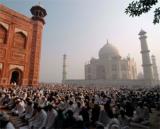
New Delhi, October 27: Devout people thronged mosques across the capital Saturday to offer prayers on the occasion of Eid-ul-Adha.
"On this auspicious day, we offer prayers and do charity. People prayed here for peace in the country, greeted each other and exchanged sweets and gifts," Maulana Mufti Mohammed Mukkaram, Shahi Imam of Fatehpuri Masjid in old Delhi, told IANS.
After offering prayers, Muslims sacrifice goats and other animals and the meat is donated to the poor according to tradition, he added.
Mehnaz Nasreen, a resident of Jamia Nagar in south Delhi, said, "On Eid, we offer 'namaz', eat 'sewainya' (sweet vermicelli) and greet each other. In the evening I have planned a get together with friends."
Eid-ul-Azha, also known as Bakr-Eid or the festival of sacrifice, is one of the most important festivals in the Muslim calendar. It is celebrated to honour Prophet Ibrahim, who was even willing to sacrifice his son Ismail to please Allah.
According to Muslim belief, Allah wanted to test Ibrahim and replaced Ismail with a sheep just as Ibrahim was about to slit his throat - hence the tradition of sacrificing an animal.




Comments
Add new comment